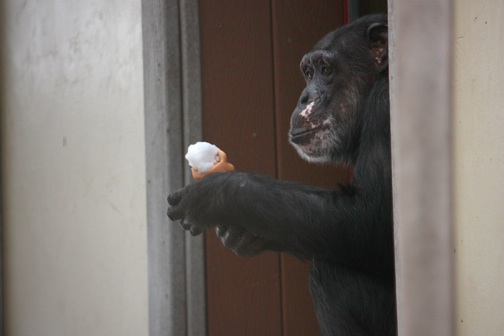What do you do when it snows in early November? If you are Jackie, you give the troll dolls “snow-fro’s” and put them out as part of the chimps’ dinner forage.
Archives for November 9, 2010
Pfizer changes Robitussin ad
Primate Patrol is an advocacy branch of CSNW that is dedicated to ending the exploitation of great apes in entertainment. If you are not already signed up for Primate Patrol action alerts, sign up here: www.primatepatrol.org/join and be sure to like the Primate Patrol Facebook page.
Volunteer Debbie has been busy this summer and fall sending out alerts to the list, and we’ve seen positive results. Combined with other organizations and activists, we’ve reached Dodge, Whatcom Educational Credit Union, and now Pfizer.
At the end of this post is the alert about Pfizer’s decision to change their recent ad for Robitussin that featured an orangutan. The orangutan, Suryia, is owned by a facility called The Institute of Greatly Endangered and Rare Species (T.I.G.E.R.S.). You’ve probably seen photos and videos of Suryia with a dog along with a story about their “friendship.” Photos of a young chimpanzee pictured with a baby white tiger that have circulated widely are also from T.I.G.E.R.S.
T.I.G.E.R.S. is a confusing organization. They claim to work for conservation, yet they train the animals in their care to perform and regularly exploit them for all sorts of entertainment purposes. They breed animals and pride themselves on putting on live shows with exotic animals, including ligers, which are a hybrid species not seen in the wild. They allow visitors to get up close and personal and “cuddle” with potentially dangerous animals, which we all know is a recipe for disaster and not in the best interest of the animals. For film use they offer that if they don’t own a particular species of animal, they “can find it.” T.I.G.E.R.S. in the business of exploiting exotic animals for profit, and Pfizer was apparently able to see this after being contacted by great ape activists.
The altered ad that Pfizer released could still be considered problematic. The human actor/computer generated chimpanzee that replaced Suyria the orangutan is actually quite good, and people may not realize he is not a real chimpanzee, so the message of great apes being funny creatures to laugh at is still present in the ad. However, Pfizer has agreed to never again use primates in advertising and they have gone to some expense to “walk their talk” by changing the commercial. They have shown that computer animation is as good if not better than using great ape actors, and they explain on the ad on their website that the chimpanzee is a “human actor enhanced by digital effects.”
Personally, I have always drawn inspiration from activist Henry Spira, and I count Peter Singer’s book Ethics into Action as one of my favorites. I believe that this move by corporations like Dodge and Pfizer and Bodum to use computer generated great apes or other marketing techniques, even if those apes are depicted as silly, is what Spira called “moving the peanut forward.”
We welcome your views on the ad and this new move towards computer animation.
Here’s the Primate Patrol action alert that was sent out yesterday:
November 8, 2010
As many of you may know, Robitussin recently aired two commercials starring Suryia, a young orangutan “actor.†Pfizer, Robitussin’s parent company, listened to great ape advocates regarding the treatment of apes in entertainment. The company chose to remove the scenes featuring Suryia and instead replace him with a computer-generated chimpanzee.
Thank you to all our supporters that contacted Pfizer with their concerns about this marketing campaign! Go here to see Pfizer’s new and progressive commercial. Click on the video link on the right of the page.
The CGI in the new commercial shows that live apes do not need to be exploited for entertainment purposes. Pfizer has made the compassionate pledge to never exploit primates in any of their commercials again.
You may remember that earlier this year Dodge chose to alter a commercial with a chimpanzee “actor†as well. Using alternative marketing images rather than live animals is a growing trend in the advertising community, and we hope that Pfizer has helped set an example for other corporations.
This development would not have been accomplished without a growing public awareness of the inherent cruelty involved in using apes for entertainment purposes. We want to thank you for your involvement in this movement – your efforts are essential in creating a voice for abused and exploited apes. Please share this exciting news with your friends, and continue to spread the word about the issues surrounding primates in entertainment. You can make a difference!
Also take a look at PETA’s press release regarding this campaign.







